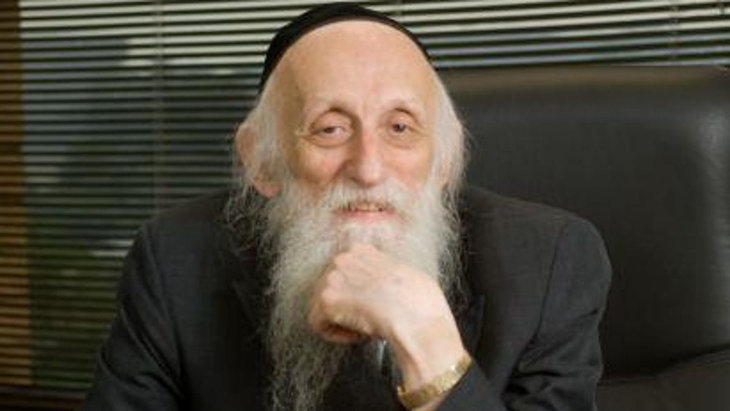 Iran’s Attack on Israel
Iran’s Attack on Israel


4 min read
Thanks to the rabbi, I felt comfortable going to a 12-step program that paved my way to recover from an eating disorder.
The death of Rabbi Dr. Abraham Twerski hit close to home for me, as it was he who paved the way for Jews to feel comfortable participating in 12-step programs. My recovery from my eating disorder at age 20 was through a 12-step program, and I ran out of the first meeting I went to. It was uncomfortable enough that the meeting was in a church basement (back then pretty much all 12-step meetings were held in rooms in churches), but then they talked about God! Although i would often hear my mother say "God-willing", Judaism was more cultural than spiritual. It was my Christian friends who actually talked about God. Jews certainly didn’t. So I ran out of that meeting thinking it was some kind of missionary ploy.
But through Rabbi Twerski’s book Living Each Day and his support of the organization “JACS” (Jewish Alcoholics, Chemically Dependent Persons, and Significant Others), that made Jews of all stripes and colors more comfortable seeking recovery from the 12-step programs. And it was the 12-steps that ultimately led me to my deep love and commitment to living a Torah-observant life.
Rabbi Twerski was a brilliant and compassionate rabbi and psychiatrist who wrote numerous books on self-esteem and personal growth. He was also one of the first rabbis to speak out against domestic abuse and violence, writing the trailblazing book The Shame Borne in Silence: Spouse Abuse in the Jewish Community. He knew what needed to be done, and did it.
And wherever Rabbi Twerski went or spoke, whether in a Jewish or non-Jewish setting, he always proudly wore his Chassidic garb, long grey beard and all.
Not only did he teach us so much during his precious 90 years of life, but he even taught us in his death. Rabbi Twerski had requested that there be no eulogies at his funeral. Instead he asked that he be escorted to his final resting place with people singing the niggun (Jewish song) he had written many years ago for his brother’s wedding. The now famous song, fondly known as “Hoshea Es Amecha” is taken from Psalms 28:9:
Hoshia et amecha uvarech et nachalatecha ur’eim venasseim ad ha’olam.
Save Your people, and bless Your inheritance and tend them, and carry them forever.
I don’t know why Rabbi Twerski made the request for this song to be sung at his funeral, but I would like to suggest three possible lessons we can learn from this.
At his own funeral, Rabbi Twerski demonstrated the character trait of humility. Instead of having the focus of his funeral on him, with people eulogizing him and praising his accomplishments, he chose to place the focus on God and the Jewish people, because Rabbi Twerski knew he was a part of something much bigger than himself.
The words are a prayer to God for the Jewish people. These words remind us that we are one people, something important to remember. Our greatest accomplishment – receiving the Torah at Mount Sinai – only occurred because the Jewish people were united.
The Torah teaches us not to count people. People are not numbers. Since this sentence has 10 words, when counting a group of people to see if there is a minyan, a quorum of 10, the words of this verse are recited instead of numbers.
It is no coincidence that Rabbi Twerski chose these words. A man who wrote so many books on self-esteem and the importance of every individual, the message in counting people with words of a psalm is:
You matter! You cannot be reduced to a mere number.
Every human being is created in the image of God. Inherent in this truth is that your self-esteem is not up for debate; you have intrinsic worth. Do we all have things that we have done or said that we are not proud of? Of course. Do we all have areas of our lives that could use improving? For sure. This is the work of a human being – to make ourselves into a more Godly being by living in concert with our soul’s desires. But our self-esteem should never be up for debate, by anyone, especially ourselves!
Rabbi Twerski, we will surely miss you. I pray that we can take what you have taught us and live as better people and as a unified people.
